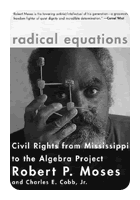 Robert P. Moses’ Radical Equations: Math Literacy and Civil Rights opens a portal in history, connecting Moses’ experiences in the 1960s southern civil rights movement to the current-day Algebra Project, which he established to teach math to middle school students. By putting the historical struggles of blacks to gain voting rights in Mississippi during the 1960s side by side with the present struggles of minority students to get the mathematics education that they need for economic access, Moses shows us the connection between social justice and math literacy.
Robert P. Moses’ Radical Equations: Math Literacy and Civil Rights opens a portal in history, connecting Moses’ experiences in the 1960s southern civil rights movement to the current-day Algebra Project, which he established to teach math to middle school students. By putting the historical struggles of blacks to gain voting rights in Mississippi during the 1960s side by side with the present struggles of minority students to get the mathematics education that they need for economic access, Moses shows us the connection between social justice and math literacy.
The history of racial politics in the United States mirrors itself in education. Moses draws this connection by examining mathematics, curriculum, teaching practices, community organizing, student achievement and equity. He takes on perceptions of the abilities of students of color, saying to his students, “You may not want to go to college but if you don’t go it should not be because you haven’t prepared yourself to go. Society is already prepared to write you off the way sharecroppers in the Delta have been written off. They say you don’t want to learn.” Moses outlines how the Algebra Project is a political movement for math literacy within communities that have not yet started to call for change. Moses articulates how organizing a community and empowering students to succeed in mathematics is a revolutionary and necessary act.
Recounting his personal experiences, Moses separates the book into two parts. Part I connects to the spirit of Ella Baker, one of the founding organizers of the Student Nonviolent Coordinating Committee, a grassroots organizer and community leader. In this section, compelling historical references and the layers of many passionate voices for the right to vote create the foundation for the spirit of the Algebra Project.
Part II deals with teaching math to students of color, questioning and looking at classroom practices, community perspectives, teachers’ perceptions and student voices. Moses focuses on how to organize communities to engage in the complexities of empowering a whole school using the Algebra Project curriculum. The Algebra Project is broken down into five steps: Physical Events, Pictorial Representation/Modeling, Intuitive Language/”People Talk,” Structured Language/”Feature Talk,” and Symbolic Representation. These allow an interactive and cooperative approach, encouraging us to view mathematics beyond their standard expression in schools. The curriculum allows students to take ownership for their learning by using intuition and exploring mathematical ideas to express their experiences.
Radical Equations’ appendix describes how to apply mathematical concepts, suggesting the curriculum of these five steps and describing a teaching approach based on students’ experiences of local travel. The appendix offers tables, diagrams and explanations of the many layers of learning in the Algebra Project. The curriculum challenges the traditional pedagogy of teaching math, moving beyond lectures and putting the teacher in the role of a classroom facilitator. Moses holds an amazing vision-a vision of how developing ongoing curriculum based on student experience is a powerful political act that can change perspectives of how mathematics is taught. Moses writes that math teachers need to know both math and how students think: “We do not have enough people with a solid enough mastery of math who are so guided by their insights into the students’ ways of thinking that they can reconceptualize the math in terms that allow their students to connect.”
Moses’ expression of social change through mathematics has created classrooms throughout the country where equal access is no longer a question and where teachers can honor all students by creating environments that allow students to bring forth their gifts and talents. Radical Equations paints a beautiful and inspirational portrait of educational evolution through political change. Moses makes us find courage to be radical, as he quotes Ella Baker: “It means facing a system that does not lend itself your needs and devising means which you can change that system.”
For more about the Algebra Project and its locations, go to its national website at http://www.algebra.org. or the Southern Initiative of the Algebra Project’s Site at http://www.algebraproject-si.org.
reviewed by Nile Malloy
Nile Malloy a mathematics teacher at Leadership High School in San Francisco, California.
